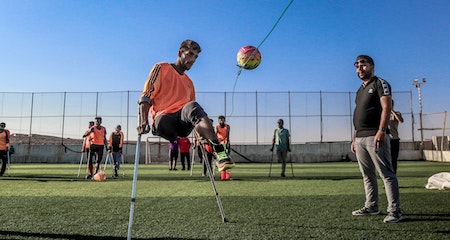Taking care of disabled people can be a significant financial burden for caregivers. However, there are methods to get paid for caregiving.
There are a variety of programs in New York to help pay family caregivers. These programs often include tax-free daily stipends, personal caregiver coaches, as well as other support services.
- Apply for Social Security Disability Benefits
It is essential to know how to apply for disability benefits if you’ve been injured or sick. Fortunately there is a guide from the Social Security Administration (SSA) has a helpful and easy-to-follow guide that will aid you in understanding what you need to do.
You’ll need to collect all medical records and documentation before beginning the process, and also any other evidence relevant to your claim. This will ensure that your claim is processed by the SSA and increase your odds of getting the payment you require to live.
The SSA also requires you to take a consultative test, which is an opportunity for you to meet with a disability examiner and discuss the way your condition affects your ability to work. This is a crucial step, as the findings of the exam could make a significant difference in whether your disability benefits are approved or denied.
Once you’ve submitted your disability claim and received a response, the SSA will process it and issue a decision within two to four months. If you are denied the SSA will provide you with the opportunity to appeal. This could take six to eight months in the average.
The SSA employs a strict definition to determine if you are eligible for SSDI when you apply. You must have a severe mental or physical condition that prohibits you from engaging “substantial gainful activities.” This means that you cannot perform the same jobs as before your disability.disability service providers melbourne
You may also be required to demonstrate that your condition hinders you from adapting to other types work. If you’re able do some work however, you might not be eligible for benefits since it is considered “substantial gainful activity.”
The most frequent condition for adults and children is an illness or injury that limits their ability to work. This could range from a temporary disability, such as an accident, or long-term conditions such as cancer.
Supplemental Security Income is a different way to get paid. This is a benefit for those who have worked for a substantial amount of time, but did not earn enough to be eligible for SSDI. This program focuses on disabled seniors, and beneficiaries primarily suffer from severe mental or musculoskeletal impairments.

One of the most challenging aspects of applying for SSDI is determining your income and calculating your monthly benefit amount. Your monthly benefit will be calculated by the SSA based on your covered earnings. These are the earnings you earned from work that you paid for Social Security and FICA taxes. This is a calculation that changes each year based on the national wage trends.
The Social Security Blue Book, which lists injuries and illnesses that automatically allow for SSDI, is a good starting point. But you can also rely on your own doctor’s assessment and evidence from medical experts such as x-rays and treatment records. These documents can be provided to your disability specialist during the process.
- Apply for Medicaid Self-Directed Care
There are several ways to get paid for taking care of disabled individuals, but one of the most effective ways is through Medicaid Self-Directed Care. It’s a great opportunity to get an income tax-free stipend, help from a coach, and access to resources to help you provide the best possible care.
A lot of states offer Medicaid waiver programs that allow beneficiaries to select and decide on the services they require. This includes home care, adult care, respite personal assistance, as well as respite. Certain states also provide support for caregivers from the family like the Louisiana Community Choices Waiver’s monitored In-Home Care program.
The Maryland Attendant Care Program (ACP) is a non-Medicaid-funded program that offers assistance in the form of financial reimbursement for attendant care provided to adults suffering from severe physical disabilities age 64 or younger. Family members who are eligible, including spouses, can receive reimbursement for their caregiving duties.
Maryland offers additional programs that permit family members to become caregivers for people with disabilities in addition to the ACP. They include the Maryland Community Pathways Waiver and the Maryland Community First Choice Program.
Minnesota does not have a state-funded program that permits individuals to employ their relatives or friends to serve as caregivers. However, there is a non-Medicaid-funded program that provides assistance to caregivers through an stipend that is tax-free every day and a coach for caregivers.
The New Hampshire Social Services Block Grant, a state-funded program offers home- and community-based services for older adults and residents suffering from chronic illnesses. Although it doesn’t appear like the SSBG program includes the option of self-directed care but it does allow participants to choose their own care providers, which is helpful in making sure they’re receiving the best quality of care.
Another option for securing the tax-free stipend for caregivers and tax-free assistance is through the Alaska Veterans Directed Care program, which offers a range of benefits for individuals who care for someone with a disability. In addition to a stipend, this program provides support for caregivers and guidance from a seasoned physician.
If you’re interested in apply for a Medicaid-funded program that offers self-directed care, you should contact your state’s State Medicaid Office. They can give you more details about the program and help you apply.
You may also have to meet certain eligibility requirements to be a part of a program for consumer-directed care for example, the creation of an individual service plan and budget. Your case manager might be able to assist you with making an ISP and offer guidance and advice on budgeting.
The Medicaid program in Connecticut, Florida, and Virginia all have developed consumer-directed care programs for disabled people. These programs allow people with long-term care needs to choose the types and amount of services they wish to receive, based on their own preferences and budget. They also permit people to pay for care from family members and other non-professional caregivers, should they choose to.
- Apply for a Disability Grant
If you are caring for someone who has disabilities, you might be wondering how you can earn money while caring for them. There are many ways to earn money while caring for someone who has disabilities.
You are eligible to apply for a Disability Grant through South Africa’s government. This grant is only available to those who have low incomes and offers financial security in the event you become disabled.
This grant is not a life-long payment but it could aid you in managing your expenses while taking care of the person you are looking after. This grant is also a good alternative if you don’t make enough to be eligible for SSDI or SSI benefits.
The SSA website has more information about this grant. You can also contact your local SSA office should you have any concerns regarding this grant.
The Social Security Administration (SSA) is a federal agency that manages programs for those who have disabilities. It assists in determining if you have a disability and the amount of your monthly benefit will be.
To be qualified for disability benefits from SSA You must be disabled for at minimum one calendar year. The agency looks at your age and work credits to determine your eligiblity. These are the wages you earn in jobs that require a Social Security Tax withheld from your pay.
Another important part of the process for claiming disability is to provide a complete list of all of your current medical conditions. This will help the SSA to understand how your handicap affects you and what everyday activities you require.
You should also include a description of any treatments you’ve received or doctor’s visits you have received prior to applying for benefits. These records can be considered by the SSA when it decides whether or not to award you benefits.
If the SSA refuses to accept your application or reduces it, you can appeal. Appeal appeals are usually successful, but you may need to provide additional information or medical records to support your claim.
It is crucial to appeal a denial within the first 65 days of receiving the SSA’s notice. Make sure you include all medical evidence that was used by SSA in its decision. Also, any statements from your doctor or hospital.
It is a good idea to have a support system that includes family members or friends who can provide advice and help you through your journey of caring for someone else. There are many support groups available for caregivers. You can also find one that is focused on the disability of your loved one.





